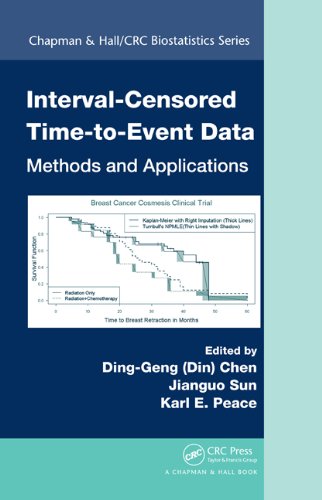

Most ebook files are in PDF format, so you can easily read them using various software such as Foxit Reader or directly on the Google Chrome browser.
Some ebook files are released by publishers in other formats such as .awz, .mobi, .epub, .fb2, etc. You may need to install specific software to read these formats on mobile/PC, such as Calibre.
Please read the tutorial at this link. https://ebooknice.com/page/post?id=faq
We offer FREE conversion to the popular formats you request; however, this may take some time. Therefore, right after payment, please email us, and we will try to provide the service as quickly as possible.
For some exceptional file formats or broken links (if any), please refrain from opening any disputes. Instead, email us first, and we will try to assist within a maximum of 6 hours.
EbookNice Team

Status:
Available0.0
0 reviews
ISBN 10: 1466504250
ISBN 13: 9781466504257
Author: Ding Geng Chen, Jianguo Sun, Karl E Peace
Review of the First Edition "The goal of this book, as stated by the authors, is to fill the knowledge gap that exists between developed statistical methods and the applications of these methods. Overall, this book achieves the goal successfully and does a nice job. I would highly recommend it …The example-based approach is easy to follow and makes the book a very helpful desktop reference for many biostatistics methods."—Journal of Statistical Software Clinical Trial Data Analysis Using R and SAS, Second Edition provides a thorough presentation of biostatistical analyses of clinical trial data with step-by-step implementations using R and SAS. The book’s practical, detailed approach draws on the authors’ 30 years’ experience in biostatistical research and clinical development. The authors develop step-by-step analysis code using appropriate R packages and functions and SAS PROCS, which enables readers to gain an understanding of the analysis methods and R and SAS implementation so that they can use these two popular software packages to analyze their own clinical trial data. What’s New in the Second Edition Adds SAS programs along with the R programs for clinical trial data analysis. Updates all the statistical analysis with updated R packages. Includes correlated data analysis with multivariate analysis of variance. Applies R and SAS to clinical trial data from hypertension, duodenal ulcer, beta blockers, familial andenomatous polyposis, and breast cancer trials. Covers the biostatistical aspects of various clinical trials, including treatment comparisons, time-to-event endpoints, longitudinal clinical trials, and bioequivalence trials.
Part I: Basic Concepts and Nonparametric Methods
Chapter 1: Introduction
1.1 Time-to-Event Data and Censoring
1.2 Types of Interval Censoring
1.3 Background of Interval-Censored Data Analysis
1.4 Related Software
1.5 Organization of the Book
Chapter 2: Notation and Basic Statistical Concepts
2.1 Time-to-Event Data
2.2 Basic Statistical Concepts in Survival Analysis
2.3 Likelihood Functions for Interval-Censored Data
Chapter 3: Nonparametric Estimation for Interval-Censored Data
3.1 Maximum Likelihood Estimator (MLE)
3.2 Self-Consistency Algorithm
3.3 Nonparametric Maximum Likelihood Estimator (NPMLE)
3.4 Specific Cases of Interval Censoring
3.5 Statistical Inference
Chapter 4: General Nonparametric Methods and Applications
4.1 The GC and KC Estimators
4.2 Kaplan–Meier-Type Estimator
4.3 Kernel Smoothing Method
4.4 Applications
Part II: Regression Analysis
Chapter 5: Proportional Hazards Models for Interval-Censored Data
5.1 Introduction
5.2 Proportional Hazards Model with Current Status Data
5.3 Proportional Hazards Model with Interval-Censored Data
5.4 Extensions and Future Work
Chapter 6: Accelerated Failure Time Models for Interval-Censored Data
6.1 Introduction
6.2 General Estimation Approaches
6.3 AFT Models for Current Status Data
6.4 AFT Models for Interval-Censored Data
6.5 Extensions
Chapter 7: Transformation Models for Interval-Censored Data
7.1 Introduction
7.2 General Transformation Models
7.3 Estimation Procedures
7.4 Applications
Chapter 8: Other Regression Models for Interval-Censored Data
8.1 Parametric Regression Models
8.2 Additive Hazards Models
8.3 Semiparametric Models
Part III: Advanced Topics and Special Applications
Chapter 9: Correlated Interval-Censored Data
9.1 Introduction
9.2 Frailty Models
9.3 Marginal Models
9.4 Other Approaches
Chapter 10: Dependent Censoring
10.1 Introduction
10.2 Models for Dependent Censoring
10.3 Applications
Chapter 11: Competing Risks for Interval-Censored Data
11.1 Introduction
11.2 Estimation of Cumulative Incidence Function
11.3 Regression Analysis
Chapter 12: Sample Size and Power Calculation
12.1 Introduction
12.2 Sample Size for Single Group
12.3 Sample Size for Two Groups
12.4 Sample Size for Regression Models
Chapter 13: Clinical Trial Design and Analysis
13.1 Design Considerations
13.2 Data Monitoring
13.3 Statistical Analysis
Chapter 14: Applications in Other Fields
14.1 Environmental Health
14.2 Engineering and Reliability
14.3 Social Sciences
interval-censored time-to-event data methods and applications
interval-censored data
interval-censored data example
censored time-to-event data
interval-censored
Tags: Ding Geng Chen, Jianguo Sun, Karl E Peace, Interval, Censored